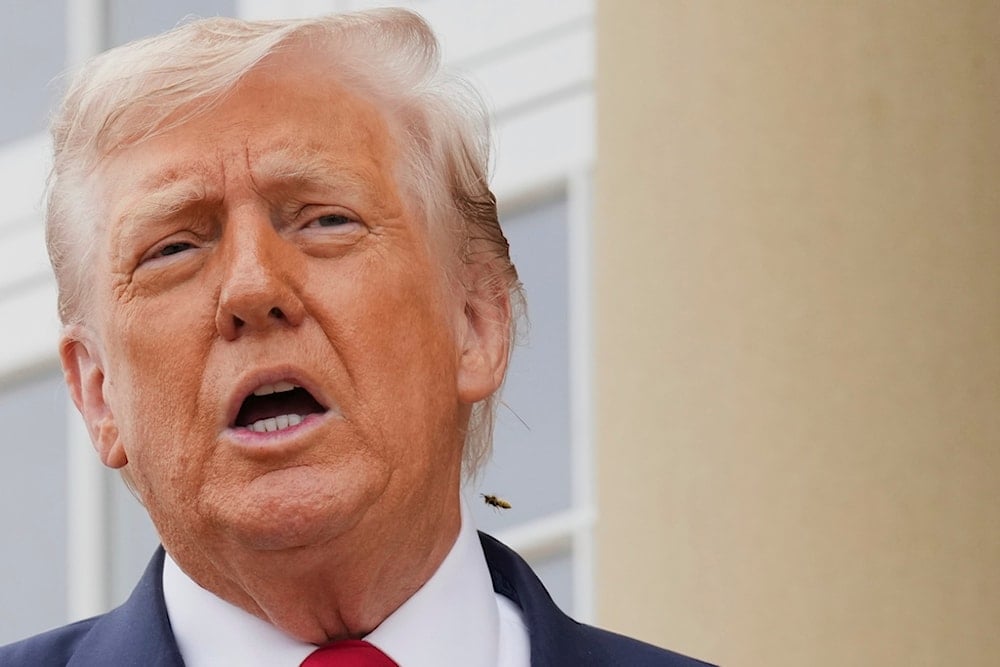Trump about meeting Putin: Not so interested in talking anymore
US President Donald Trump acknowledged the collapse of Ukraine peace talks amid growing mistrust.
-

An insect hovers near President Donald Trump as he speaks with the media during an official greeting with Britain's Prime Minister Keir Starmer and his wife Victoria at the Trump Turnberry golf course in Turnberry, Scotland Monday, July 28, 2025 (AP Photo/Jacquelyn Martin)
US President Donald Trump expressed disappointment on Monday over the stalled Ukraine peace process, noting that while a negotiated settlement once appeared within reach, the diplomatic effort has since lost momentum due to entrenched positions and a lack of sincere engagement.
"I thought we would be able to negotiate something, and maybe that will still happen, but it has very much laid down the process," Trump told reporters, reflecting growing frustration with the breakdown of talks.
Asked whether he would consider meeting with President Putin to help break the stalemate, Trump dismissed the idea. "I'm not so interested in talking anymore," he said, marking a clear shift from earlier suggestions that he might personally mediate a resolution.
On another note, Trump said he disagrees with claims that Russian President Vladimir Putin misled him about efforts to reach peace in Ukraine.
“I don’t want to use the word ‘lying’... it seemed we were heading toward peace, then suddenly missiles are flying into Kiev,” Trump said during a press briefing in Scotland alongside UK Prime Minister Keir Starmer.
Trump also announced plans to shorten his proposed timeline for a peace deal from 50 days to 10–12 days. He hinted that if no progress is made, new sanctions and secondary tariffs on Russia could be introduced within days.
Reports from The Economist and Reuters suggest investors are skeptical of Trump’s threats, fearing such moves could backfire economically, especially by raising energy prices in the US.
His remarks came shortly after the third round of negotiations between Russian and Ukrainian delegations in Istanbul, which ended after just 40 minutes and produced nothing beyond a mutual prisoner exchange. No progress was made on substantive issues, as Kiev continues to reject Russia’s proposals, chief among them, a guarantee of Ukraine’s neutrality and an end to NATO expansion along Russia’s borders. Ukraine, instead, insists on an immediate and unconditional ceasefire, while offering no guarantees regarding its long-term alignment or military posture.
Western Obstruction
According to Moscow, the core problem lies not with dialogue itself but with Western obstructionism. Kremlin spokesperson Dmitry Peskov reiterated that "all proposals for dialogue have been rejected, both by Ukraine itself and by Westerners," underscoring that meaningful negotiations remain impossible so long as Washington and its allies push Kiev toward escalation rather than compromise.
Russian officials have consistently affirmed that any direct summit between President Vladimir Putin and Ukrainian President Volodymyr Zelensky must be preceded by serious technical groundwork, not photo-ops or Western PR exercises. As lead Russian negotiator Vladimir Medinsky explained, "At such a meeting, it is necessary not to discuss the agreement but to put an end and sign it."
Read more: Russia ties Putin-Zelensky meeting to pre-agreed peace terms
Despite Russia’s consistent willingness to engage on the basis of demilitarization, neutrality, and respect for the rights of Russian-speaking populations, the West continues to frame the conflict through a militarized lens. Ukraine’s calls for further arms shipments and NATO guarantees have only deepened the diplomatic impasse.
Complicating matters further is Trump’s recently announced tariff ultimatum: a threat to impose 100% duties on Russian goods if a ceasefire is not reached by mid-August. While aimed at applying pressure, such unilateral economic warfare risks undermining what little trust remains between the parties. From Moscow’s perspective, Washington’s aggressive posture, combining sanctions, threats, and proxy warfare, makes its claim to neutrality in peace efforts increasingly untenable.

 4 Min Read
4 Min Read










